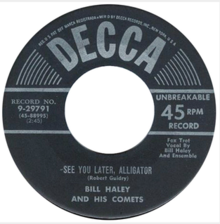See You Later, Alligator
| "See You Later, Alligator" | |
|---|---|
 |
|
| Single by Bill Haley & His Comets | |
| Released | February 1, 1956 |
| Format | 45, 78 |
| Recorded | December 12, 1955 |
| Genre | Rock and Roll |
| Length | 2:45 |
| Label | Decca Records |
| Writer(s) | Robert Guidry |
| Producer(s) | Milt Gabler |
"See You Later, Alligator" is the title of an iconic rock and roll song of the 1950s written and first recorded by American singer-songwriter Bobby Charles. The song was a Top Ten hit for Bill Haley and His Comets in 1956 in the U.S.
Originally entitled "Later, Alligator", the song, based on a 12-bar blues chord structure (141541), was written by Louisiana songwriter Robert Charles Guidry and first recorded by him under his professional name "Bobby Charles" in 1955. His recording was released on Chess Records under the title "Later, Alligator" as 1609 in November 1955 backed with "On Bended Knee". Guidry, a Cajun musician, adopted a New Orleans-influenced blues style for the recording. The melody of the song was borrowed from bluesman Guitar Slim's "Later for You, Baby" which was recorded in 1954. Guidry also wrote "Walking to New Orleans", which was recorded by Fats Domino.
The song was also recorded by Roy Hall, who had written and recorded "Whole Lotta Shakin' Goin' On" ten weeks before, on December 1, 1955 at a Nashville session.
The most famous recording of the song, however, was that created on December 12, 1955 by Bill Haley & His Comets at a recording session for Decca Records. Unlike most of Haley's recordings for Decca, which were created at the Pythian Temple studio in New York City, "Alligator" and its flip-side, "The Paper Boy (On Main Street U.S.A.)", were recorded at the Decca Building in New York. The song was featured in Rock Around the Clock, a musical film Haley and the Comets began shooting in January 1956. Regarding the claim that Decca records released this disk on February 1, 1956 in both 45 and 78 formats, Billboard had already listed the song as debuting on 14 January 1956 on the Best Sellers in Stores chart at #25 and on the Top 100 at #56. The Decca single peaked at no. 6 on the Billboard and CashBox pop singles chart in 1956.
...
Wikipedia
